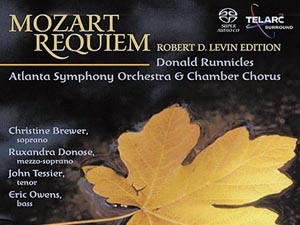|
Audio
Photos
More from MPR
Resources
|
 |
| Mozart: Requiem – Donald Runnicles/Atlanta Symphony Orchestra and Chamber Chorus (album cover) |
St. Paul, Minn. — It's impossible to know exactly how Mozart wanted his final composition to sound. The "Requiem" (or Mass for the Dead) was left unfinished when he died in 1791. However, Mozart did go over the work in fine detail with his friend and former student, Franz Xaver Sussmayr. At the request of Mozart's wife Constanza, Sussmayr completed the manuscript after Mozart's death.
Despite what you may have seen in the well-known play and film "Amadeus," Antonio Salieri had little to do with the "Requiem."
It was commissioned by Count Franz von Wallsegg who wanted to have it performed at a private memorial service for his wife. After paying for it in full, the Count was hoping to pass it off as his own composition.
Mozart's wife violated the terms of the contract by keeping two copies of the manuscript after sending it off to the Count. She had her reasons, mostly financial. She also had parts of the "Requiem" performed at Mozart's memorial.
The Atlanta Symphony Orchestra's principal guest conductor, Donald Runnicles, leads the orchestra and the Chamber Chorus in this version of Mozart's "Requiem" re-thought by Robert Levin in 1993. Rather than replacing it, Levin tried to improve upon Sussmayr's work. Levin pared back the orchestration so the vocal parts can be better heard. At some points he drops the instruments entirely. That move, he says, was inspired by Mozart's other church music.
One place you can hear how Levin thins out the orchestration is in the "Lacrimosa". The orchestra is barely there, pulsating in the background as the chorus gently floats above it.
Compare that to a 2003 recording of Mozart's "Requiem" with Nikolaus Harnoncourt and Concentus Musicus Wien on Deutsche Harmonia Mundi and you can really hear how Levin limits the instrumentation. Harnoncourt takes a bolder approach to Sussmayr's work. Near the end of the "Lacrimosa", the orchestra builds with so much brass and percussion that it almost drowns out the chorus.
Levin adds an "Amen" fugue after the "Lacrimosa" based on a sketch written in Mozart's hand which Sussmayr did not use. It changes the whole way you hear the "Lacrimosa", bringing this section to a powerfully dramatic conclusion.
Donald Runnicles is a master at exploiting dynamic range. The "Dies Irae" is a good example of this approach. Runnicles shapes the sound so that it undulates from phrase to phrase. The effect is hypnotizing.
Overall, Runnicles is going for a softer, swifter approach. One place this is really noticeable is in the "Kyrie". When I compared this new recording of the "Kyrie" with the earlier release from Nikolaus Harnoncourt, it sounds to me as though Runnicles takes the section in cut time. Instead of ending it rather prayerfully as Harnoncourt does, Runnicles makes an emphatic exclamation in the final, "Lord have Mercy!"
Donald Runnicles is focused on a lighter, more buoyant Mozart, which is demonstrated by his quicker tempos and through his choice of soloists. American soprano Christine Brewer, Romanian mezzo-soprano Ruxandra Donose, Canadian tenor John Tessier and American bassist Eric Owens offer a mesmerizing, almost angelic performance in the Tuba Mirum.
The Atlanta Symphony Chamber Chorus is the real backbone of this performance. It's led by Norman Mackenzie, who worked closely with founder Robert Shaw for fourteen years. Remarkably, the singers are all volunteers who are chosen by audition from the ranks of the full Atlanta Symphony Orchestra Chorus. Their clear, bright sound on this recording is captured by the expert miking of the Telarc engineers. This sound is more intimate than some that are recorded in large, reverberant cathedrals.
It might seem odd to celebrate Mozart's 250th birth anniversary with his "Mass of the Dead," but I have to admit I was uplifted after listening to this new recording of one of the absolute masterworks of Western classical music. Donald Runnicles and the Atlanta Symphony Orchestra and Chamber Chorus bring a wonderful sense of energy to this performance. The spirited combination heard here creates the sense that Mozart's "Requiem" really celebrates life, not death, and that's not a bad thing in the dead of winter.



